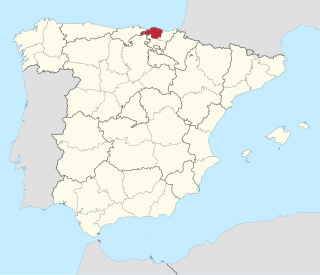
Biscay or Bizkaia, is a province of the Basque Autonomous Community, heir of the ancient Lordship of Biscay, lying on the south shore of the eponymous bay. The capital and largest city is Bilbao.
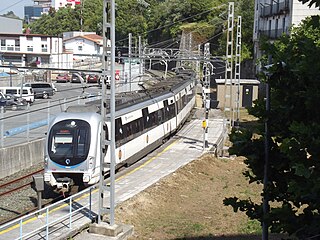
Euskotren Trena, formerly known just as Euskotren is a commuter, inter-city and urban transit train-operating company that operates local and inter-city passenger services in the provinces of Biscay and Gipuzkoa, in the Basque Country, Spain. It is one of the four commercial brands under which Euskotren operates, as a public company managed by the Basque government. The entire 181.1-kilometre (112.5 mi) network uses 1,000 mm narrow gauge rail tracks which have been owned by the Basque Government since their transferral from the Spanish government; the rail tracks and stations were part of the FEVE network until its transferral. Euskotren Trena also operates the Donostia/San Sebastián metro under the brand Metro Donostialdea.
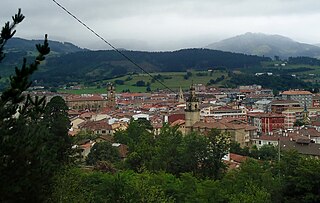
Durango is a town and municipality of the historical territory and province of Biscay, located in the Basque Country, Spain. It is the main town of Durangaldea, one of the comarcas of Biscay. Because of its economical activities and population, Durango is considered one of the largest towns in Biscay after the ones that compose the conurbation of Greater Bilbao.

Zalla is a town and municipality located in the province of Biscay, in the Autonomous Community of the Basque Country, northern Spain, 24 kilometers to the southwest of Bilbao. The river Cadagua runs through the city. According to the 2019 census, it has 8,447 inhabitants.
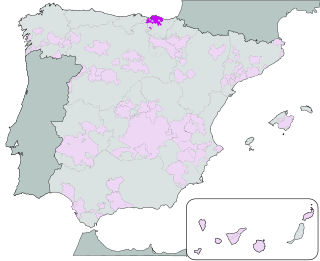
Txakoli de Bizkaia – Bizkaiko Txakolina is a Spanish Denominación de Origen Protegida (DOP) for wines, located in the province of Bizkaia, Basque Country, Spain. The DOP includes vineyards from 82 different municipalities.
Juan Manuel Bilbao Azkarreta, also known as Jon Bilbao or Jon Bilbao Azkarreta was a university instructor, a bibliographer, and an activist for Basque nationalism. He compiled the bibliographic section of the Enciclopedia general ilustrada del País Vasco (1970), and the monumental Eusko-bibliographia: diccionario de bibliografía vasca, which has been described as "one of the most significant reference works on Basque studies".
Euskotren, formally known as Basque Railways, is a public railway company controlled by the Basque Government and officially established in 1982 to operate several 1,000 mm narrow gauge railways inside the autonomous community of the Basque Country, under the terms of the Statute of Autonomy of the Basque Country. Originally operating under the commercial brand ET/FV, it took control of the management and operations of the narrow gauge lines formerly operated by the railway company FEVE. The commercial brand eventually changed to Euskotren, as it remains today. Since 2006, the infrastructure on which the company runs its trains has been owned by Euskal Trenbide Sarea.
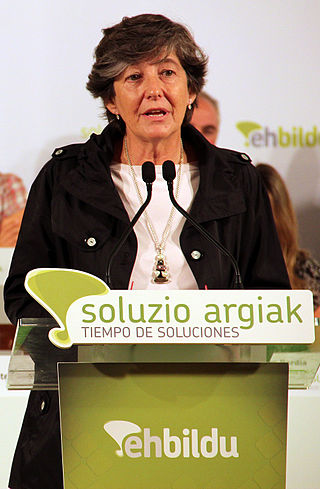
Laura Mintegi Lakarra is a Basque author, politician and a professor at the University of the Basque Country. Although she was born in Navarre, she moved to Biscay at an early age and has lived there ever since; first in Bilbao and later in Algorta.
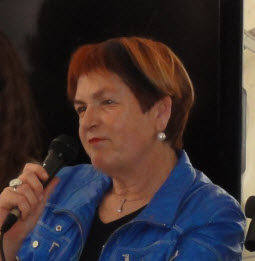
Mariasun Landa Etxebeste is a Spanish writer. Most of her literary production has been developed in the Basque language in the field of children's and young people's literature. She is one of the writers in Basque language more translated to other languages.

Women in the Basque Nationalist Party in Francoist Spain were involved in leadership positions from an early period. The Basque Nationalist Party (PNV) was founded prior to the Second Spanish Republic in Bilbao, as a conservative Roman Catholic organization. They initially tried to be neutral during the Civil War, but later more openly opposed Nationalist forces. This led to repression and investigation after the war of women PNV members, and wives and daughters of male PNV members. Emakume Abertzale Batza, PNV's women political section, was operated in exile in this early period.
In the run up to the 2019 Spanish local elections, various organisations carried out opinion polling to gauge voting intention in local entities in Spain. Results of such polls for municipalities and the three foral deputations in the Basque Country are displayed in this article. The date range for these opinion polls is from the previous local elections, held on 24 May 2015, to the day the next elections were held, on 26 May 2019.

Oskar Matute García de Jalón is a Spanish politician and a member of the Congress of Deputies of Spain. He was previously a member of the Basque Parliament.

Joseba Agirreazkuenaga is a researcher and historian. He is specialist in the history of the Basque Country particularly: the crisis of the Ancien Régime; the fueros, self-governance, the economic concert between Spain and the Autonomous Community of the Basque Country and its fiscal system, and the social movements both in Bilbao and in the Basque Country as a whole.

Vicenta Antonia Moguel Elguezábal was a Spanish writer and translator who was the first woman to write in the Basque language. In Basque Country, she is known by the local spelling of her name, Bizenta Mogel Elgezabal.
In the run up to the 2023 Spanish local elections, various organisations carry out opinion polling to gauge voting intention in local entities in Spain. Results of such polls for municipalities and the three foral deputations in the Basque Country are displayed in this article. The date range for these opinion polls is from the previous local elections, held on 26 May 2019, to the day the next elections were held, on 28 May 2023.
Euskotren is a public railway operator in the Basque Country, Spain. Its rolling stock is formed by electrical multiple units used for Euskotren Trena commuter rail services, trams running on the Bilbao and Vitoria-Gasteiz tramway networks, and locomotives for hauling freight trains.
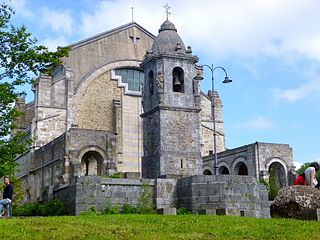
The Sanctuary of Saint Anthony the Abbot and Saint Anthony of Padua of Urkiola is a Catholic temple located in the hill and port of Urkiola, in the Biscayan municipality of Abadiño, in the Basque Country, Spain. It is unknown exactly how old the Sanctuary is, but according to some documents, it could have been between the 8th and 11th centuries, making it one of the oldest of the region. It is located at the heart of the Urkiola Natural Park, next to one of the historical routes linking the Cantabrian coast with the Castilian plateau and surrounded by a lush nature in which the limestone walls of the mountains of Durangaldea stand out as a background, with the Anboto as the highest altitude, where Basque mythology places the main dwelling of its highest deity, Mari.
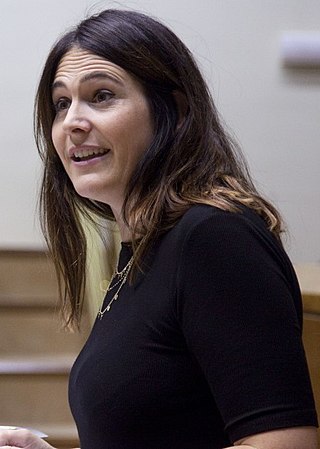
Leixuri Arrizabalaga Arruza is a Basque lawyer and politician affiliated with the Basque National Party. She started her political career at a young age as town councillor in her hometown Gatika. She was a member of the Basque Parliament for Biscay from 2012 to 2023, and also served as mayor of Gatika from 2015 to 2021. She was her party's leading candidate for Biscay in the 2020 Basque Parliament election. In 2023 she was appointed to the Provincial Council of Biscay, serving as foral deputy of Basque Language, Culture and Sport and government spokesperson under Deputy General (president) Elixabete Etxanobe.
Francisco Juaristi Larrinaga, known as Patxi Juaristi, is a Basque sociologist, linguist, writer and university professor, current vice-rector of the University of the Basque Country.












